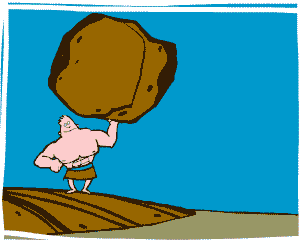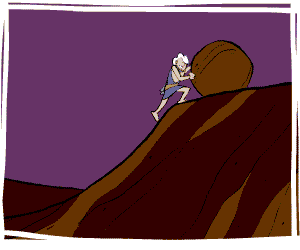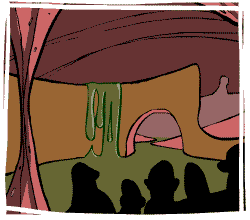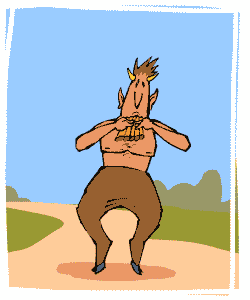
Hercules Are the Greek myths relevant today? Consider the extent to which characters from Greek mythology appear in everyday speech. For instance, a huge or heroic task is said to Herculean. This is in tribute to the Greek mythological hero Hercules and his Labors.
Sisyphus In another figure of speech from Greek mythology, a Sisyphean task is one that requires continual effort that never quite pays off. This is named for Sisyphus, who paid eternally for his crimes by rolling a boulder uphill. Every time it reached the top, it rolled back down again and Sisyphus was compelled to start anew.
Tantalus It's because of a mythological sinner named Tantalus that "to tantalize" entails holding something desireable just out of reach. Like Sisyphus, Tantalus was sent to the Underworld's region of eternal punishment, where he stood in a pool of water under boughs laden with fruit yet could satisfy neither hunger nor thirst.
Midas The Midas touch, or the gift of profiting from whatever one undertakes, is named for a legendary king of Phrygia. Midas was granted the power to transmute whatever he touched into gold.
Atlas A book of maps gets its name from Atlas, the Titan who supported the heavens on his shoulders.
The Titans Something colossal in size or power (such as a supposedly unsinkable ocean liner) is said to be titanic. This adjective comes from the Titans, the gargantuan firstborn sons of the goddess Earth.
Procrustes Here's one you probably don't use in everyday conversation, but it turns up in the newspaper with surprising frequency. It's a Procrustean effort that forces evidence into a theory when it doesn't fit, just as Procrustes violently adjusted his guests to fit their bed.
The Styx Stygian can mean infernal, gloomy or characteristic of death, since it comes from the river Styx in the Underworld of the Dead.
Prometheus The word Promethean describes a daringly creative or defiantly original act because of the Titan Prometheus, who defied the wrath of the gods by stealing fire in order to benefit humankind. (The full title of Mary Shelley's famous novel is Frankenstein, or The Modern Prometheus.)
Achilles A point of vulnerability is an Achilles' heel, because the mythological warrior Achilles had been magically protected in all but that part of his body.
Pan And finally here's a word you may have used before without realizing your debt to Greek mythology. The word panic comes from the goat-god Pan. |











